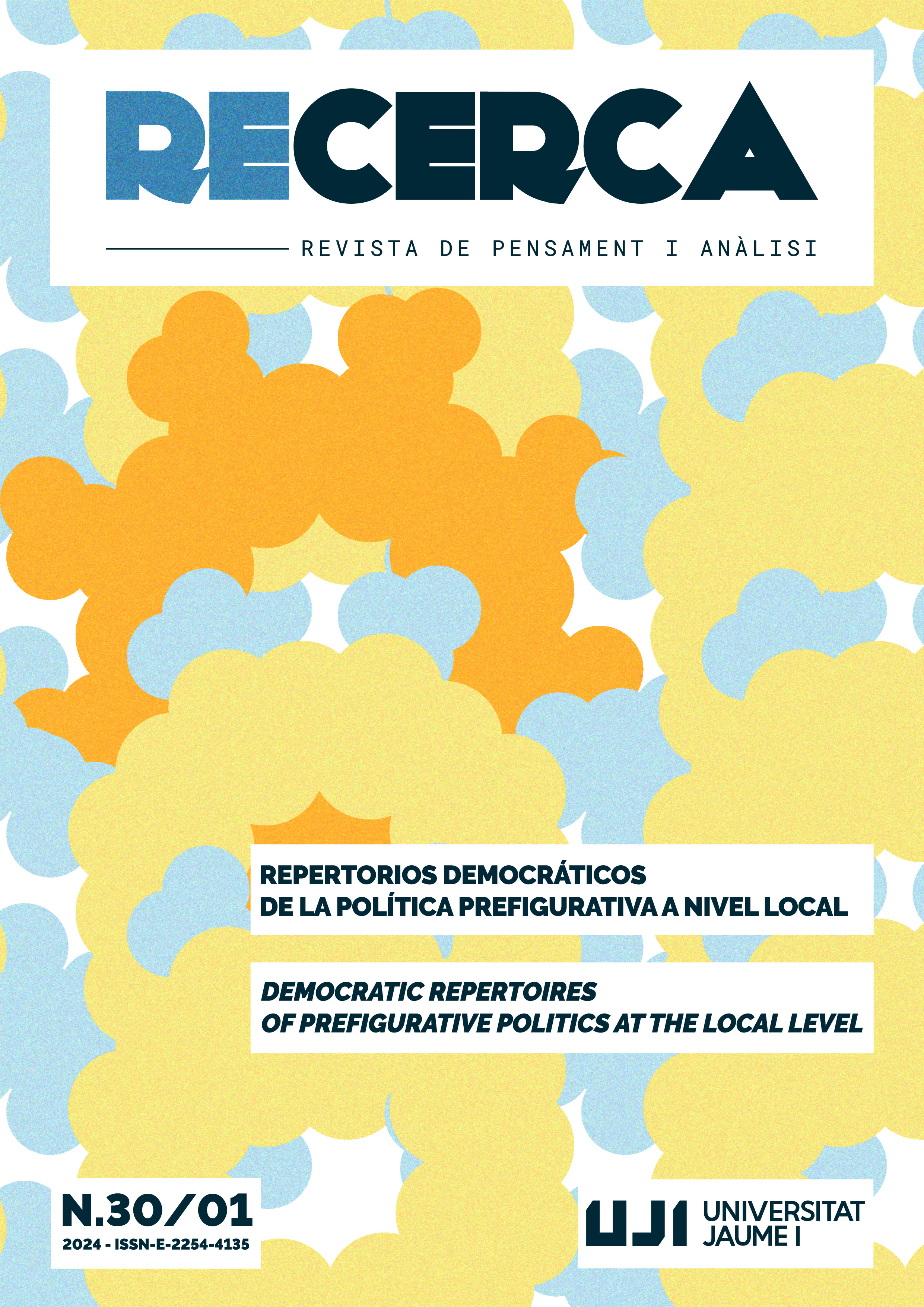¿Un derecho a las noticias? Justificación moral y protección jurídica del derecho ciudadano a la información
Contenido principal del artículo
Resumen
¿Puede tener la ciudadanía un derecho a recibir noticias de calidad? Hay quien cree que semejante derecho es inviable porque las obligaciones que de él se seguirían implicarían una supresión de facto de las libertades periodísticas. En este artículo defiendo que ese problema afecta solo al derecho a las noticias si se lo concibe como derecho jurídico subjetivo. Concebido como un derecho moral, el derecho de la ciudadanía a las noticias es no solo compatible con las libertades periodísticas, sino el fundamento moral de la institución periodística misma. Además, argumento que el derecho a las noticias puede (y debe) tener importantes efectos jurídicos, ya que impone a las administraciones públicas una obligación de adoptar medidas para protegerlo, las cuales clasifico en directas e indirectas.
Descargas
Detalles del artículo
Citas
Alexy, Robert (1993). Teoría de Los Derechos Fundamentales. Madrid: Centro de Estudios Constitucionales.
Atienza, Manuel y Ruiz Manero, Juan (1996). Las Piezas del Derecho. Teoría de Los Enunciados Jurídicos. Barcelona: Ariel.
Bull, Thomas y Corder, Hugh (2012). Freedom of and right to information. En Tushnet, Mark, Fleiner, Thomas y Saunders, Cheryl (Eds.). Routledge Handbook of Constitutional Law (219229). London: Routledge.
Carreras i Serra, Lluís de (2008). Las normas jurídicas de los periodistas: derecho español de la información. Barcelona: Editorial UOC.
Ceva, Emanuela y Ferretti, Maria Paola (2020). Political Corruption: The Internal Enemy of Institutions. New York: Oxford University Press.
Christiano, Thomas (2008). The Constitution of Equality: Democratic Authority and Its Limits. Oxford: Oxford University Press.
Christiano, Thomas (2011). An Instrumental Argument for a Human Right to Democracy. Philosophy and Public Affairs, 39(2), 142176. https://doi.org/10.1111/j.1088-4963.2011.01204.x
Cruft, Rowan (2022). Journalism and Press Freedom as Human Rights. Journal of Applied Philosophy, 39(2), 359-376. https://doi.org/10.1111/japp.12566
Cunningham, Frank (2002). Theories of Democracy: A Critical Introduction. London: Routledge.
Díez Bueso, Laura (2002). La relevancia pública en el derecho a la información: Algunas consideraciones. Revista Española de Derecho Constitucional, 66, 213-240.
Dworkin, Ronald (2011). Justice for Hedgehogs. Cambridge: Harvard University Press.
Feldman, Stephen M. (2015). Free Speech and Free Press. En Tushnet, Mark, Graber, Mark A. y Levinson, Stanford (Eds.). The Oxford Handbook of the U.S. Constitution (629-649). New York: Oxford University Press. https://doi.org/10.1093/oxfordhb/9780190245757.013.30
Fiss, Owen M. (1996). The irony of free speech. Cambridge: Harvard University Press.
Floridi, Luciano (2013). The Ethics of Information. New York: Oxford University Press.
Freedman, Des, Obar, Jonathan A., Martens, Cheryl y McChesney, Robert W. (Eds.) (2016). Strategies for Media Reform: International Perspectives. New York: Fordham University Press.
Gomis, Lorenzo (1993). La Notícia, dret humà. Barcelona: Barcanova.
González-Ricoy, Iñigo (2013). An Account of the Democratic Status of Constitutional Rights. Res Publica, 19(3), 241-256. https://doi.org/10.1007/s11158-013-9219-5
Guastini, Riccardo. (1999). Distinguiendo: Estudios de Teoría y Metateoría del Derecho. Barcelona: Gedisa.
Lebovic, Sam (2016). Free Speech and Unfree News: The Paradox of Press Freedom in America. Cambridge: Harvard University Press.
Lichtenberg, Judith (1990). Foundations and limits of freedom of the press. En Lichtenberg, Judith (Ed.). Democracy and the Mass Media: A Collection of Essays (102-135). Cambridge: Cambridge University Press.
Miller, Seumas (2009). The Moral Foundations of Social Institutions. Cambridge: Cambridge University Press.
Marciel, Rubén (2022). Democracia, desinformación y conocimiento político: algunas aclaraciones conceptuales. Dilemata, 38, 69-86. https://www.dilemata.net/revista/index.php/dilemata/article/view/412000475
Marciel, Rubén (2023). On citizens’ right to information: Justification and analysis of the demcratic right to be well informed. Journal of Political Philosophy, 30(3), 358-384. https://doi.org/10.1111/jopp.12298
Marciel, Rubén (2025). Deliberative Newsworthiness: A Normative Criterion to Promote Deliberative Democracy. Journal of Media Ethics, 40(1), 28-32. https://doi.org/10.1080/23736992.2024.2444207
Moreso, José Juan y Vilajosana, Josep María (2004). Introducción a la teoría del derecho. Madrid: Marcial Pons.
Nickel, James W. (2008). Rethinking Indivisibility: Towards A Theory of Supporting Relations between Human Rights. Human Rights Quarterly, 30(4), 984-1001. https://doi.org/10.1353/hrq.0.0046
Nino, Carlos Santiago (1989). Ética y Derechos Humanos: un ensayo de fundamentación. Barcelona: Ariel.
Ortega Gutiérrez, David (2017). El derecho a la información: balance y cuestiones pendientes. Revista de Derecho Político, 100, 671699. https://doi.org/10.5944/rdp.100.2017.20714
Ozawa, Joao V. S., Lukito, Josephine, Bailez, Felipe y Fakhouri, Luis G. P. (2024). Brazilian Capitol Attack: The Interaction between Bolsonaro’s Supporters’ Content, WhatsApp, Twitter, and News Media. Harvard Kennedy School Misinformation Review, 5(2), 114. https://doi.org/10.37016/mr-2020-137.
Persily, Nathaiel y Tucker, Joshua, A. (Eds.) (2020). Social Media and Democracy: The State of the Field and Prospects for Reform. Cambridge: Cambridge University Press.
Raz, Joseph (1988). The Morality of Freedom. Oxford: Oxford University Press.
Raz, Joseph (1995). Ethics in the Public Domain: Essays in the Morality of Law and Politics. Oxford: Clarendon Press.
Richardson, Brian (2004). The Public’s Right to Know: A Dangerous Notion. Journal of Mass Media Ethics, 19(1), 46-55. https://doi.org/10.1207/s15327728jmme1901_4
Sábada, Charo y Salaverría, Ramón (2023). Combatir la desinformación con alfabetización mediática: análisis de las tendencias en la Unión Europea. Revista Latina de Comunicación Social, 81, 17-33. https://www.doi.org/10.4185/RLCS-2023-1552
Scanlon, Thomas Michael (1978). Freedom of Expression and the Categories of Expression. Pittsburgh Law Review, 40, 519-550.
Scanlon, Thomas Michael (2013). Responsibility and the Value of Choice. Think, 12(33), 9-16. https://doi.org/10.1017/s1477175612000280
Schauer, Frederick (1983). Rights and the Right to Know. Philosophic Exchange, 14(1), 65-76.
Urías, Joaquín (2014). Principios de derecho de la información. Madrid: Tecnos.
Villaverde Menéndez, Ignacio (1995). Los derechos del público. El derecho a recibir información del artículo 20.1.d) de la Constitución Española de 1978. Madrid: Tecnos.
Villaverde Menéndez, Ignacio (2018). Artículo 20.1.a) y d), 20.2, 20.4 y 20.5. La libertad de expresión. En Alcubilla, Enrique Arnaldo y Peñalver, Jesús Remón (Eds.). Comentarios a la Constitución Española, Tomo I (581-616). Madrid: Fundación Wolters Kluwer, Boletín Oficial del Estado, Tribunal Constitucional y Ministerio de Justicia.
Waldron, Jeremy (1989). Conflicts in Rights. Ethics, 99(3), 503-519. https://doi.org/10.1086/293094
Wenar, Leif (2013). The nature of Claim-Rights. Ethics, 123(2), 202229. https://doi.org/10.1086/668707


